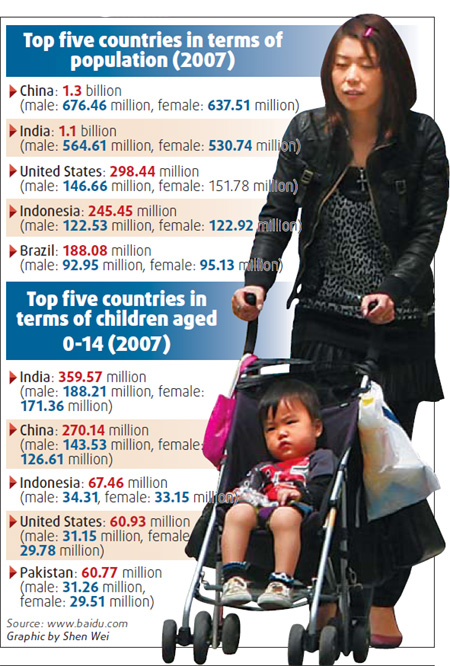
|
BIZCHINA> Top Biz News
 |
|
Baby first, no kidding!
By Sun Xiaohua (China Daily)
Updated: 2009-06-01 10:00
The prospect of having a baby is enough to make many people break out into a cold sweat. These days the challenges ahead are not just sleepless nights and a drastic change in lifestyle but also the growing cost in financial terms.
The healthy couple, who have been married for five years, live comfortably with a higher-than-average income in a small apartment and have a car. But after checking with friends and colleagues, he was appalled at the impact fatherhood would have on his take-home pay. "I would have to spend thousands of yuan on the baby every month," Huang said, who calculated a monthly spend of 1,000 yuan on milk powder, 500 yuan on disposable diapers and 1,500 yuan on kindergarten - a total of 3,000 yuan. "Most importantly, I would need to get a bigger apartment of at least 100 sqm so my parents or in-laws could move in," he said. Huang said both he and his wife would continue to work, necessitating the roping in of grandparents to help with childcare. He reckoned almost all the couple's approximately 15,000 yuan monthly income would be spoken for. More than 16 million couples in China took the leap into parenthood last year, and it's a figure that is growing 10 percent year-on-year. In 2008, about 25 million babies were born in China. There were more than 100 million infants under the age of six - a figure close to half of the entire population of the United States. Beijing Answer Marketing Consulting Ltd, a company engaging in researching statistics about children, discovered average spending on youngsters aged up to six years accounted for one-third of a family's expenditure. And the cost doesn't always end when the child comes of age. Some parents fork out for a car or even a place to live for their loved one. The baby care market is worth about 500 billion yuan a year and is expected to double next year.
Analysts are widely agreed that the baby goods industry can serve as a locomotive to drive China's domestic consumption. Chinese parents, like those of any other nation, want the best for their children and, with the now traditional 4-2-1 structure of grandparents, parents and child, the youngster is the focus of a lot of attention. Many born in the late 1970s and 1980s were products of the one-child policy that continues to this day. A survey by Beijing Answer Marketing Consulting Ltd conducted between 2007 and 2008 looked at the expenditure pattern on youngsters as they grew up. For those aged under three, food, especially milk powder, took up most of the expenditure at between 40 and 60 percent. Next came disposable diapers, which took up 20 to 30 percent of costs. For youngsters between the ages of three and six, education costs began to exceed food bills. Most Chinese turn to overseas manufacturers and service providers rather than domestic companies when searching for products because they have higher guarantees on quality and safety. Milk powder is a typical example of this preference. "I only feed my baby girl with imported milk powder," said Liesel Wang, an employee at a German company in Shanghai, who has a two-year-old girl. "Although the price is about five or eight times that of domestic milk powder, I believe it is worth the cost because the food security examination is much more stringent." After the tainted milk powder scandal erupted last year, more and more Chinese parents agree with Wang, buying milk powder from the US, EU countries and Japan. "Even in my village, people have given up on Chinese milk powder and turned to the foreign brands," said Tian Lanying, a woman who lives in rural Henan province. "Nestle is popular now." Assuming a fifth of babies are not breast-fed, that means more than three million of them would be relying on milk powder, according to last year's birth statistics. The figure is most likely higher because many mothers return to work after their statutory three-month maternity leave. That creates a market running into billions for foreign brands, analysts said. The fear of food insecurity has stretched into other aspects of baby care products. "Once you're aware of one thing it just spreads and you start questioning everything," Wu Yiming, a father living in Beijing said. "You can drive yourself absolutely crazy trying to ensure your baby stays healthy." Overseas brands also dominate the domestic toy market. Chen Hu, vice president of Letao.com, China's biggest online toy shop, said now the website only sells imported or foreign brand toys, because they have "safe raw materials and design". Indeed, that point has been emphasized on the packaging, after the tainted milk powder episode. With monthly sales of about 1 million yuan, the best sellers in Chen's Internet shop are the US brand of Little Tikes and the French brand of Bao. Most of the buyers are from big cities, such as Beijing, Shanghai and the affluent metropolises in Jiangsu and Zhejiang provinces, according to Chen. However, sometimes, a foreign brand name also gets tainted. Baby bath products from Johnson & Johnson China were revealed to contain formaldehyde, a toxic material possibly linked with the development of cancer. "I was driven mad with worry by the incident," said Wang, who used Johnson & Johnson products on her baby daughter. "I am really confused about whom I should trust." The straightforward answer is that safety guarantees are the key to finding gold in China's babycare industry.
 (For more biz stories, please visit Industries)
|
||||||